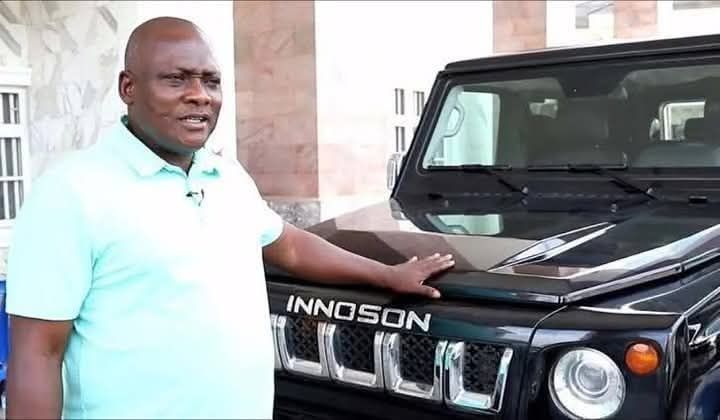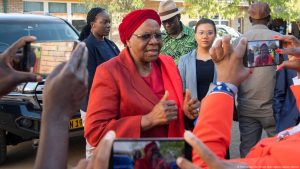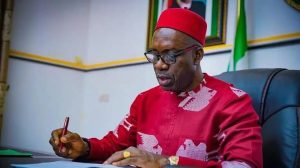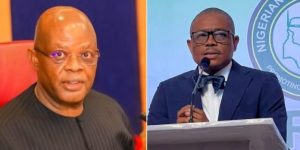Anambra: Why I’m Silent Over Soludo’s Demolition of My Head Office, Showroom — Innoson Boss Speaks
In the bustling industrial city of Nnewi, a recent government action sent shockwaves across the economic and political landscape of Anambra State: the demolition of the head office and showroom of Innoson Vehicle Manufacturing (IVM), Nigeria’s first indigenous automaker.
The demolition, carried out by agents of the Anambra State Government under the directive of Governor Chukwuma Charles Soludo, was said to be part of an expansive road dualisation project aimed at modernizing infrastructure and easing traffic congestion within the town.
However, the unexpected pulling down of the multimillion-naira edifice has stirred mixed reactions. Public opinion remains sharply divided, with a segment of the population siding with the government’s urban renewal vision, while others view the action as an attack on one of Anambra’s proudest industrial icons.
Amidst the uproar, accusations, and political interpretations trailing the incident, one voice has remained strikingly calm and measured — that of Dr. Innocent Ifediaso Chukwuma, the Founder and Chairman of Innoson Group.
YOU MAY READ
Anambra Government Partially Demolishes Innoson Motors Head Office, Justifies Action
In his first public reaction to the controversy, Chukwuma revealed why he has chosen to maintain silence and not join the cacophony of accusations.
“I cannot say anything now till I meet Governor Soludo and talk with him about what was demolished. He is my very good friend, and we do a lot of things together. A lot of people were saying one thing or the other concerning the matter, but their inciting disturbances cannot influence me to say what I should not say. I will meet with Mr. Governor over the demolition, and I believe our talks shall be fruitful. Until then, I reserve my comments,” he stated.
For many, Chukwuma’s calmness may seem puzzling, given the extent of the financial and symbolic loss inflicted by the demolition. However, close observers of Anambra’s socio-political circles are not entirely surprised.
Dr. Chukwuma and Governor Soludo share more than just a passing acquaintance; they share years of mutual respect, collaborations, and a common interest in the economic development of Anambra State.
During Soludo’s 2021 gubernatorial campaign, Innoson was notably one of the corporate titans that expressed support for his vision to transform Anambra into a modern, livable, and prosperous homeland. Even before then, Soludo had championed policies at national and international levels that aligned with indigenous economic empowerment — ideals that resonated deeply with Chukwuma’s industrial philosophy.
Sources familiar with their relationship describe it as one built on “mutual trust,” with occasional business collaborations, including government patronage of Innoson vehicles for official use.
YOU MAY READ
outrage in Anambra as Teenager is Killed, Sister Raped, Community Demands Justice as Police Arrest Suspect
Given this background, it becomes easier to understand Chukwuma’s deliberate restraint and preference for dialogue over media warfare.
The events leading to the demolition began earlier this year when the Anambra State Ministry of Works commenced a massive urban renewal project in Nnewi and other key towns. Part of the plan involved expanding major roads to ease persistent traffic bottlenecks — a plan that, according to government sources, had been on the drawing board for over a decade.
Officials alleged that parts of the Innoson head office and showroom encroached on government-acquired land earmarked for road expansion under previous administrations.
Despite notices served to affected structures, Innoson sources insist that proper consultations and negotiations were not concluded before bulldozers moved in.
Eyewitness accounts reveal that security operatives accompanied the demolition team, and the exercise proceeded without violent resistance. Yet, the sight of heavy-duty equipment pulling down the signature blue-and-white structures of Innoson sent ripples of disbelief across the community.
Social media exploded with videos and pictures showing the flattened property. Emotions ran high, and narratives quickly polarized into two camps: those blaming the government for alleged “insensitivity” and “disrespect for indigenous businesses,” and those supporting Soludo’s “no-sacred-cows” approach to development.
At the heart of the debate is the clash between legal rights and moral obligations.
YOU MAY READ
We have a few people who invested millions of Naira in Big Brain 9ja . We have not touched even 1 Kobo from their investment.
From a strictly legal perspective, experts argue that the government has the constitutional authority to demolish structures obstructing public works, provided due process is followed, including issuance of notices, provision of alternatives, and payment of compensation where necessary.
However, from a moral and strategic standpoint, critics argue that Innoson is not just any private enterprise — it is a national brand, a symbol of local ingenuity, and a key employer of labor in the Southeast. As such, they contend that greater sensitivity and consultation were required before taking such an action.
“Innoson is to Anambra what Dangote is to Lagos,” said Chief Chuka Nnabuife, a prominent businessman and community leader.
“Demolishing his head office sends a wrong signal to investors and upcoming entrepreneurs that they are not safe, even when they contribute massively to the economy.”
Social media commentators echoed similar sentiments, with hashtags like #RespectInnoson and #ProtectLocalInvestors trending briefly on Nigerian Twitter (now X).
Conversely, supporters of the government, including some urban planning advocates, praised Soludo’s boldness, arguing that entrenched interests should not be allowed to derail public good.
“Modern cities are not built on sentiments,” argued Engr. Nonso Maduabuchi, a civil engineer based in Awka.
“If you travel abroad, you will see that urban renewal sometimes requires painful sacrifices. Soludo is trying to build for the future.”
In this emotionally charged atmosphere, Dr. Chukwuma’s decision to remain silent appears both statesmanlike and strategically astute.
For one, it avoids escalating the matter into a political showdown that could deepen divisions in Anambra’s already sensitive political terrain.
Secondly, it keeps open the channel of communication between himself and Governor Soludo, preserving the possibility of an amicable resolution that could benefit both parties.
Moreover, by refusing to be dragged into media sensationalism, Chukwuma reinforces his image as a pragmatic, mature industrialist who values dialogue over drama.
Observers note that the Innoson boss’s handling of the situation contrasts sharply with typical reactions of aggrieved Nigerian elites, who often resort to public denunciations, lawsuits, or political vendettas.
As Chukwuma prepares to meet with Governor Soludo, various scenarios could unfold:
- Compensation and Reconciliation: The government could offer compensation or alternative support, leading to public reconciliation and perhaps even a joint announcement showcasing a strengthened partnership for Anambra’s development.
- Quiet Settlement: The matter could be settled privately, with minimal public disclosure, preserving both parties’ dignity.
- Further Legal or Political Action: If discussions fail, Innoson could seek legal redress or quietly lobby through influential channels to secure restitution.
However, insiders suggest that given the personalities involved — two men known for intellect and negotiation skills — the first scenario of compensation and reconciliation remains the most likely.
The Innoson-Soludo saga carries broader lessons for governance, investment, and industrialization in Nigeria.
First, it highlights the perennial tension between public interest projects and private property rights — a balancing act that requires deft management and effective communication.
Second, it underscores the need for government policies to be sensitive to the unique contributions of indigenous businesses, especially those creating employment, promoting local technology, and enhancing national pride.
Third, it reaffirms the value of conflict resolution through dialogue rather than confrontation, setting a positive example for other stakeholders facing similar disputes.
Finally, it sends a subtle reminder to business owners to ensure that their developments comply fully with planning regulations, as future governments may not be as accommodating.
Ultimately, the handling of this issue will be a litmus test of leadership on both sides.
For Governor Soludo, it is an opportunity to demonstrate that his urban renewal agenda is not anti-business but pro-development, capable of balancing public needs with private sector interests.
For Dr. Chukwuma, it is a chance to show that true leadership involves not just building factories but building relationships, even in the face of adversity.
As Anambra watches and waits, many hope that this episode, rather than fracturing alliances, will birth a deeper, more strategic partnership between one of Africa’s finest industrialists and one of its brightest technocrats — for the greater good of Nnewi, Anambra, and Nigeria at large.
Whatever the outcome, Dr. Chukwuma’s dignified silence has already spoken volumes.





